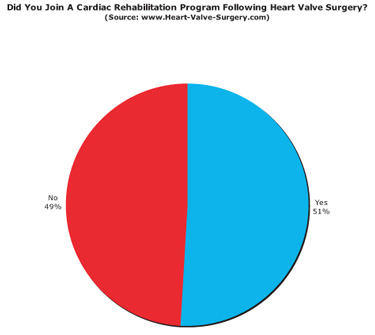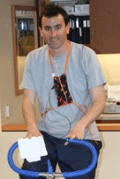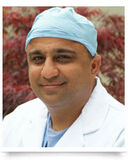Recovery Alert: Cardiac Rehab Programs Are “Under-Utilized”
By Adam Pick on July 30, 2009
One of my critical heart valve surgery recovery tips for patients is… to attend a cardiac rehabilitation program following heart surgery.
From my own personal experience and patient research, I have learned that cardiac rehab programs provide significant benefit to the physical and emotional well-being of patients during heart surgery recovery. Unfortunately, I have also learned that 49% of patients do not attend cardiac rehab.
On Tuesday, a report published in the Journal of the American College of Cardiology further supported the data and opinion referenced above. The highlights of this study which surveyed 72,187 patients discharged from hospitals after a heart attack, angioplasty of bypass surgery between 2000 – 2007, include the following:
- Even though cardiac rehabilitation has been shown to guard against future heart trouble once a cardiovascular event has landed someone in the hospital, only 56 percent of these patients are referred for the therapy.
- Despite national guidelines that say hospitalized patients with a qualifying cardiovascular disease event should be referred to outpatient cardiac rehabilitation before hospital discharge, the study demonstrates this doesn’t happen often enough.

“Cardiac rehabilitation improves clinical outcomes, but is widely underutilized,” said researcher Dr. Gregg C. Fonarow, a professor of cardiology at the University of California, Los Angeles. “A large number of patients hospitalized with coronary artery disease may be having recurrent cardiovascular events and deaths that could be prevented by greater participation in cardiac rehabilitation programs,” Fonarow added.
The study also suggests that among the 156 hospitals surveyed, there was no consistency in referring patients to cardiac rehab. “These cardiac rehabilitation referral rates varied widely by hospital, ranging from as low as 0 percent of eligible patients referred, to as high as 100 percent of patients referred,” Fonarow said.
Dr. Byron Lee, an associate professor of cardiology at the University of California, San Francisco, says that cardiac rehabilitation can be just as effective in preventing another heart attack as the drugs these patients take. “It is shameful how physicians under-utilize cardiac rehabilitation in the United States,” Lee said. “We emphasize expensive drugs and interventions, when a simple rehabilitation program can do just as much, if not more, to reduce the risk of death and recurrent heart attack,” he said.
I have to admit… I was thrilled to read this report. I can not tell you how many patients I speak with that experience difficult recoveries and do not attend cardiac rehab. I am hopeful that this study will serve as a fantastic reminder / wake-up call to the medical community (especially cardiologists and surgeons) that cardiac rehab should be highly recommended, if not deemed necessary, following cardiac surgery. Plus, cardiac rehab is fun!

Adam At Cardiac Rehab Riding An Exercise Bike
I have several, wonderful memories from my 8-week cardiac rehab program at Torrance Memorial Hospital. The patient-to-patient and nurse-to-patient exchange was full of support, encouragement, relatedness, trust and… patient success stories. Considering the challenges I faced during my early recovery from aortic valve replacement (pain, cardiac depression, etc.), I consider the day I entered cardiac rehab as the day my recovery truly began.
So you know, in line with the study referenced above, neither my surgeon nor cardiologist initially referred me to cardiac rehab.
Keep on tickin!
Adam
|
lislepammysue says on July 30th, 2009 at 1:07 pm |
|
I am due for a new aortic valve in the future — severe stenosis. And boy , I plan to go to rehab. I work out 5 days a week now and the inactivity after surgery is going to kill me. The angiogram was bad enough. I can see where pain is the factor. But you gotta move. |
 |
|
Danielle says on July 30th, 2009 at 1:08 pm |
|
i was referred to Cardiac Rehab, however, they required that I ask my insurance if i was covered. I did, and was told that it is an exclusion and not covered. They did not enroll me, as it can be quite expensive. They did give suggestions on gradually increasing my walking time each day. I try to get outside to walk several times a day. |
 |
|
Marilyn says on July 30th, 2009 at 1:41 pm |
|
I was referred to Rehab by my surgeon, my GP, and my cardiologist. The insurance paid for everything! The eight weeks were invaluable to me, I really felt stronger when it was over. . They do have an after program that I would pay for but I am trying to continue what they taught me at home. |
 |
|
Lisa says on July 30th, 2009 at 1:54 pm |
|
I am a registered nurse and had a mitral valve repair in 12/08 and started cardiac rehab 3 weeks post op. It was an invaluable experience to be able to compare notes with other patients and get input from a nurse who has worked with many other cardiac patients. I did even know there was such a thing until one of my cardiologists mentioned it just days before my surgery, and I have worked on telemetry floors!! I will begin volunteer work for Mended Hearts in the next couple of weeks visiting heart surgery patients in the hospital, I plan on recommending it to them. It also helped my doctors diagnose an arrythmia I was having because of the cardiac monitoring while in class. I now hope to work as a cardiac rehab nurse in the future. I cannot say enough on how important cardiac rehab is. |
 |
|
Sylvia Woolworth says on July 30th, 2009 at 2:43 pm |
|
My cardiac rehab was delayed because two months after my aortic valve replacement, my husband had left hip replacement. (thank goodness we can get new parts) Now three months after my surgery we are both going to rehab. Brick N J hospital has arranged our PT appointments at the same time or within a half hour. (three days a week) I am quite impressed with my therapy. I wear a heart monitor and all the information goes to a computer as I exercise. The nurses are extremely helpful, guiding and encouraging me. Week two, I do 15 minutes on the treadmill (2.7), also the bicycle (3.1), and ten minutes with the arm cycle. I have started back at the Y for water exercise, but swimming is harder. I do a little side stroke and breast stroke and paddle on my back for relaxation. Just being in the water after three months is the best. The whole class at the Y gave me a cheer when I came back and my instructor gave me a big hug. Having a support team is the best. Sylvia Woolworth |
 |
|
Ludmila Khalid says on July 30th, 2009 at 3:31 pm |
|
Hi Lisa, |
 |
|
Lisa says on July 30th, 2009 at 3:53 pm |
|
Mila, |
 |
|
Patricia says on July 30th, 2009 at 6:47 pm |
|
I had a PT come to my house for the rehab. I have severe arthritis in both knees so a gym wouldn’t have been good for me. |
 |
|
Midge says on July 30th, 2009 at 7:25 pm |
|
I’m six months out from AVR and did not go to cardiac rehab because there is nothing available locally and it would have required at least 2 hrs travel each way to get to a cardiac rehab provided by my HMO. If there had been something available locally I would probably have tried that, but there was nothing. Have been told by numerous people that many cardiac rehab programs no longer exist because the majority of insurances don’t cover them and to pay out of pocket can get pretty expensive. Heart monitors are readily available on the internet and I would love for someone to write a book designed for those who cannot attend rehab. I would guess that most cardio doctors could give you guidelines but it sure would be nice to have written info about what types of excercises to do, duration, etc. Maybe someone knows about one that is available. Walking is great and I have done it regularly since my surgery, but feel I should (could) be doing more. Midge |
 |
|
Sandra Urbanowicz says on July 30th, 2009 at 7:30 pm |
|
This is such an interesting article. I had mitral valve repair and atrial/septal aneurysm repair last July 2008. I was in hospital 20 days total and when I was to be discharged I asked about a cardiac rehab program and was told that it was not meant for people like me but they would refer me anyways and there was a possibility that they may take me. I guess the consensus is that unless you’ve had a heart attack, the program would be of no benefit. Fortunately, for me, they took me on and it was the most helpful, encouraging part of my recovery. After heart surgery it is very scary not knowing how much you can do – the program starts you out slowly and before you know you are doing so much more than you ever thought you could. It gives you such confidence and you are also sharing your experience with others who have been through similar surgery. The exercise, the comraderie, the overall great feeling I had after every session was worth more than I can say. When you get home from the hospital sometimes the last thing you want to do is go through another new experience with new people but believe me, it is the best thing you can do for your recovery. If a program is not mentioned upon your release ask about it, it will be the best thing you ever did. |
 |
|
Kerrigan says on July 31st, 2009 at 11:00 am |
|
I can’t say enough good things about the 12-week cardio rehab program I completed after surgery. And continuing with the 3-day-a-week 1 1/2 workout afterward is the key to quick recovery! I HIGHLY recommend it. |
 |
|
Vicki says on August 29th, 2009 at 4:55 pm |
|
I had two heart attacks, two angioplastys, and one stent all within four days. While I was still in CCU I asked my physician about cardiac hrehab and he ordered it for me. I just completed my 24 visits in 8 weeks (I am 16 weeks post MI). Cardiac rehab is the best and probably the most important thing I have ever done for myself. I hope to continue through the self-pay phase. Most of the patients I met in cardiac rehab were post CABG and under Medicare which allows 36 visits. I think it is great that all the CABG patients were in rehab but I don’t understand why cardiac rehab isn’t recommended as frequently to heart attack patients as it is CABG patients. My first heart attack was a serious right inferior MI. The second attack was four days later and caught early (since I was a patient in CCU); a stent was implanted in the area causing the trouble with 80% blockage. The recovery was slow but cardiac rehab has made me a new person. |
 |
|
Rick says on September 27th, 2009 at 11:52 am |
|
Thank you for the article. I will be entering my rehab starting next month which will be 3 days a week for 8 weeks. I had a stent placed in my LAD artery. I am very anxious to start as I want to regain or get close to my previous level of exercise and activity. I am glad to hear and see your much more severe procedure has went so well. All the best. |
 |
|
Steve McDonald says on September 27th, 2009 at 9:24 pm |
|
CAN ANYONE TELL ME ABOUT PRE OP EXERCISE PROGRAMS. I’M READING ABOUT SOME PEOPLE GETTING IN GREAT SHAPE BEFORE SURGERY. BUT IF YOUR AV IS SHOT HOW DOES ONE GET INTO GREAT SHAPE? I WALK BETWEEN 2 TO 4 MILES A DAY ON MY JOB, BUT AM AFRIED TO DO ANY CARDIO WORK SINCE MY AV IS WORKING OVER TIME TO PUSH BLOOD OUT. ALSO I UNDERSTAND HAVING SOME STRONG AB’S WILL BE OF GREAT HELP POST OP. ANY INPUT WOULD BE GREAT. |
 |
|
Jo V. says on October 19th, 2009 at 1:59 am |
|
I am an RN who had mitral valve repair March 2009. To combat the fear that is inherent in an medical professional who works with cardiac patients, I used Bellaruth Naperstek’s guided imagery CD “Preparing for Successful Surgery.” Guided imagery CD’s are part of the cardiac program at the Cleveland Clinic, rated +1 by U.S. News and World reports for cardiovascular surgery. That CD helped turn my attitude 180 degrees. I entered the surgical suite rested, laughing and joking with my surgical team. Came out feeling like road kill but that is a different matter. As far as physical preparation, I religiously rode my bike outside in Northern Illinois for the three months preparing for my procedure. You would have to involve your physician in an exercise program so he could define your limitations but the exercise made a great deal of difference in my recovery. Although admittedly I am 50 years old, I went in on Monday and came home on Friday- (lost a day due to nausea post op from pain meds and anesthesia). Best of luck. Be sure to prepare mentally. |
 |
|
Helga Mukhar says on October 29th, 2009 at 5:48 pm |
|
Hi, Adam, Thank you again for your wonderful book. It made my husband decide to have his aortic valve replaced now instead of later. His opening was at He had his surgery four weeks ago and was in the hospital for six days. Anyway, it turned out he had atrial fibrillation and we ended up in the ER that day. They gave him metoprolol 50 mg, which made him very tired and slightly lightheaded. He was so weak that he had to sit down when he brushed his teeth. Another side effect was diarrhea. His cardiologist wanted him to remain on the medication for three months. Well, after 15 days on the medication, I decided to stop it. We had been monitoring his blood pressure and his heart rate every three hours anyway. We’ve been continuing to monitor him and he has been fine for the last six days. I believe he will continue to do fine. Our blood pressure machine will show if his heart rate should become irregular. He has not been on the treadmill since. We’ve taken walks outside up to half an hour. When do you think he should start cardio rehab? Does he need to since we have a treadmill? His surgeon seemed to think he doesn’t need it. Your advice is much appreciated. And again, your book was extremely helpful. Blessings to you and your family! Helga |
 |
|
Lisa says on October 29th, 2009 at 8:12 pm |
|
Helga, |
 |
|
Pam says on April 23rd, 2010 at 11:37 pm |
|
I had a aortic valve replacement due to an anurism on New Year’s Eve and a Pace Maker put in on Jan. 5 2010. It has been long and difficult, but was not told about Cardiac Rehab. I happened to be walking past a room in the hospital with a sign that said Cardiac Rehab, went in and talked with the last week, and will start on Monday. The nurse there told me all of the things that I was going through mentally and physically and can’t wait to start! |
 |
|
Mary Pfister says on April 24th, 2010 at 12:18 pm |
|
I am scheduled for aortic valve replacement on Wed., 4/28, and I have already inquired about cardiac rehab and I was told I would receive a call a month after surgery asking if I want to participate. I plan to go as I read Adam’s book several times and I am sure it will be very helpful for me. I am 69 years old. Thanks for your book, Adam! |
 |
|
Monika Sideris says on May 30th, 2010 at 11:27 pm |
|
I had my ARV surgery in August of 2008. I regret not to attend rehab (I would have to pay a major part of the rehab cost). Now, i would do anything to go to rehab. Will it be too late to do so? I still have not my energy back and also gained a lot of weight. |
 |
|
terry says on June 29th, 2016 at 4:49 am |
|
How soon May I use stationary bike and run after open heart surgery? |
 |













